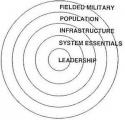Interesting. The same site also has a letter from LTC Davis with additional information:
andScott Shane from the New York Times will publish a story on the actions I’ve taken, and the Armed Forces Journal will simultaneously publish an article i’ve written explaining why I submitted a Department of Defense Inspector General complaint against select senior leaders of the Armed Forces for so being so deceptive to the US Congress and American people that the truth is no longer recognizable — and the biggest bill-payer for this deception has been the lives and bodies of America’s service men and women.
more at the link.Part of my AFJ article includes a link to a web site I set up for the purpose of hanging the unclassified report for everyone to see (the AFJ article is only 2,400 words, while the unclassified report is 86 pages; the classified report is 58 pages). However, there is a battle within the Army Public Affairs on releasing the document, which I submitted for review on 20 January – the same day I disclosed to the Army’s senior leaders and my chain of command what was coming. Officers from the Army Media Relations department tried to pry it loose on Friday because they believe it is the right thing to do, but someone – they didn’t tell me who – overruled them and said it would take longer still…














Bookmarks